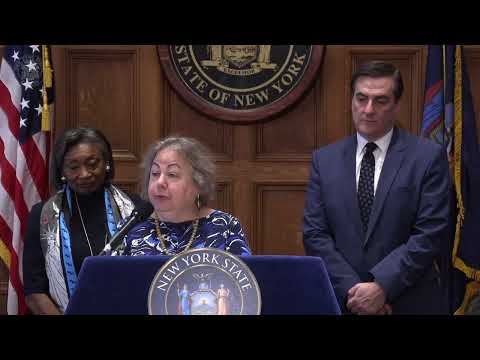
Testimony Before The New York State Division Of Housing & Community Renewal Regarding Proposed Changes Of The Rent Stablization Code, The New York City Rent And Eviction Regulations & The Emergency Tenants Protection Regulations On December 4th, 2006
Liz Krueger
July 15, 2010
My name is Liz Krueger, I represent the 26th Senate District, and serve as the Ranking Democratic Member of the State Senate’s Committee on Housing, Construction and Community Development. I am here to testify on behalf of myself and the following colleagues from the legislature who are not able to, but share my concerns about these proposed changes:
State Senators: Tom Duane, Efrain Gonzalez, Ruth Hassell-Thompson, Velmanette Montgomery, George Onorato, Diane Savino, Eric Schneiderman, Toby Stavisky, State Senator-Elect: Shirley Huntley, Bill Perkins, Assemblymember: Alexander “Pete” Grannis
I want to thank you for providing me with this opportunity to testify on the proposed amendment changes in the Rent Stabilization Code (RSC), the New York City Rent and Eviction Regulations and the Emergency Tenant Protection Act (EPTA). I urge the Division of Housing & Community Renewal (DHCR) to seriously reconsider and reject many of these proposed amendment changes.
Legally Mandated Lead Paint Abatement Work Should Not Be Eligible for Major Capital Improvement (MCI) Increases
The proposed change to permit owners who must complete lead abatement work in compliance with the requirements of NYC Local Law 1 (the Local Lead Law) to apply for Major Capitol Improvement (MCI) increases would have an adverse effect on many low, moderate and middle-income tenants and essentially punish tenants for poor housing conditions. The NYC Lead Law was enacted to ensure that families, particularly those with young children who are especially vulnerable to the health risks created by lead paint and dust, are protected and live in decent housing conditions. Due in large part to New York City’s aggressive enforcement of the law, it has been a success and childhood lead poisoning has decreased significantly since it was enacted. The law was deemed necessary and ultimately successfully implemented because there was a consensus reached among the various stakeholders that apartments with children under the age of six must be free of lead paint to meet minimum housing quality standards. Owners should not be permitted to transfer the costs of meeting these basic standards and doing necessary lead paint abatement work to their tenants, especially if they are doing so in compliance with a local law designed to eliminate a known health hazard for children. Furthermore, this proposal could greatly increase rental costs for many of the poorest families, who disproportionately live in the worst housing conditions where lead paint is often present. This would also be contrary to the requirements for State legislated MCIs which specifically state that for work to qualify as an MCI, it must be building-wide, not simply a repair, and deemed depreciable under the U.S. tax code and by definition, lead paint abatement is non-depreciable. The proposed amendment to subparagraph (iii) of subdivision (a) of §2522.4 is troubling because it would allow owners to apply for Major Capital Improvements for lead paint abatement work not only in common areas but also in occupied individual apartments:
With the approval of the DHCR, there has been an increase in services or improvements, other than repairs, on a building-wide basis, which the owner can demonstrate are necessary in order to comply with specific requirements of law, including, but not limited to, that abatement of lead-based paint throughout the common areas of a building and any occupied apartment subject to the requirements of Local law 1 of 2004 of the City of New York, or of any successor thereto, regarding the prevention of childhood lead poisoning.
These changes would be particularly harmful because tenants would now be forced to pay for what is defined as a Class C violation under the City’s Housing Maintenance Code and the City’s Housing, Preservation & Development’s (HPD) housing code violation system. A Class C violation is a housing condition that is a serious threat, deemed immediately hazardous. It would also undermine another important state statue, the Warranty of Habitability which states that tenants have the right to “safe, habitable, decent housing conditions.” Eliminating a “a known health hazard” should not be considered a “benefit” to the tenant, as stated in the Needs and Benefits section of the Regulatory Impact Statement of the Sate Register. Living in safe, decent housing is considered a right under various New York State and City laws.
Further, under this proposed change, tenants could also be forced to pay for lead paint abatement work in common areas – not defined as a risk to children. Owners would now have an economic incentive to do what is generally considered unnecessary work simply to get larger rent increases and more quickly drive up rents making them less affordable for many tenants. Allowing this proposed amendment change to go through would send a terrible message that tenants, particularly those with young children, have to be charged a premium to live in housing that is safe and to avoid their children becoming sick. This is a disturbing message to be coming from the State’s agency whose mission is to assure the maintenance of safe and decent housing.
Owners Should Not Be Allowed to Collect Two Months Security Deposits
If the DHCR unilaterally makes the decision to give owners the right to increase the amount of security deposit required, it would have an extremely deleterious effect on affordable housing in New York City. This proposed change would allow owners to charge tenants up to two months rent as a security deposit, instead of the one-month limit which has been the practice since the inception of these regulations:
“further provided, however, with respect to initial leases entered into after 0ctober 1, 2006, and any renewals thereof, no owner shall demand, receive or retain a security deposit or advance payment for or in connection with the use or occupancy of a housing accommodation which exceeds the rent for two months... except where so long as the tenant is 65 or older, where the rent is paid by a government agency in whole or in part or where the tenant receives disability benefits under the Social Security Act (or SSI).”
While the exception for current tenants, senior citizens and those living in subsidized housing somewhat ameliorates the great harm this amendment would have on tenants, these exceptions by themselves do not make this proposal acceptable and it should be rejected.
This proposal is contrary to the purposes of the Rent Stabilization Law (RSL) and the Emergency Tenant Protection Act (ETPA) “to prevent exactions of unjust, unreasonable and oppressive rents and rental agreements and to forestall profiteering, speculation and other disruptive practices tending to produce threats to the public health, safety and general welfare...” (RSL Section 26-501 and Mck. Uncons. Laws. Section 8621). The requirement that a tenant only pay one month’s rent as security in his/her initial lease has been the procedure since rent stabilization’s initiation in 1968 (Rent Stabilization Code Section 63). In fact, these provisions were borrowed from the applicable State and City rent control regulations, which had previously limited security deposits to one month’s rent.
The current proposal would represent a huge policy mistake. Tenants who are currently seeking affordable housing are particularly vulnerable and sensitive to any increased pressures in housing costs. With nearly thirty percent of NYC tenants paying over fifty percent of their income in rent (a record high), it is clear that this new regulation would impose a drastic increase in housing costs for low-income tenants. This financial burden is highlighted by the fact that nearly 70% of low income New Yorkers (households with income levels at 100% of the poverty line or less), and 60% of moderate income New Yorkers (100-200% of the poverty line), have $1,000 or less in savings. Overcrowding rates nearly doubled between 1981 and 2002, the number of homeless, including families and children, are at a record high, and middle income tenants are being forced out of their communities due to escalating rents. Doubling Security Deposits will only add to these problems.
DHCR's published statement that this proposed change will not create an increase in costs for tenants is unsupported and factually, incorrect. All data clearly demonstrates that a doubling of the security deposit maximum will create an immense hardship for many tenants trying to rent a stabilized apartment in New York City and the three suburban counties. The median income for rent stabilized tenants has decreased between 2001 and 2004 from $35,000 a year to $32,000. Meanwhile, the average monthly initial rent for a stabilized apartment in New York City has increased annually. According to the 2005 Housing Vacancy Survey, this average is $1,011. However, many housing experts believe that the current average asking price for a rental apartment is significantly higher. Currently, a prospective tenant must have the first month’s rent, one month’s security deposit and a broker’s fee of, on average, 15% of the first year’s rent. The average prospective tenant, with a median income of $32,000 per year, does not have the resources to be able to move into an apartment with such a large cost attached.
DHCR states in its objectives that this proposal is "to provide(s) for the continued viability of the housing stock for future tenants." In order to re-rent vacant apartments, landlords do maintain their housing stock by making necessary repairs. A landlord is then able to charge an increased rent after the unit is vacant. DHCR can point to no studies that suggest that landlords are prevented from fixing up an apartment because they lack having a security deposit of more than one month’s rent. If the continued viability of the housing stock were an actual problem, DHCR could produce an alternative remedy that would not burden all new tenants.
For almost four decades these provisions have existed without controversy. DHCR can produce no study that shows that the limit of one month’s rent creates a financial hardship for landlords. In contrast, all of the current data which pertain to the housing situation in the NY metro area indicates that this area is experiencing a housing affordability crisis. In fact, we are experiencing the worst housing crisis in modern memory. The housing emergency, which caused the enactment of the RSL, continues today. According to the 2005 Housing and Vacancy Survey, the vacancy rate is 3.09% and a severe shortage of affordable housing still exists. This proposed change serves no valid public policy need. If DHCR adopts this proposed change, the agency, which exists in order to enforce the rent laws, will actually be in violation of the express purpose of the Rent Stabilization Law.
High Income Decontrol of Buildings that Receive 421-a or J-51 Tax Abatements Should Not Be Permitted
This amendment would override the 421-a section of the Real Property Tax Law and the J-51 provisions of the New York City Administrative Code to allow for the deregulation of units that are receiving the tax abatements. The proposal would allow buildings to become eligible for high-income rent decontrol, notwithstanding that the Rent Stabilization Law itself states that neither high income nor high rent deregulation apply (RSL §26-501.1 and §26-504.2) to buildings with these Tax Abatements.
One of the most beneficial aspects of the 421-a program is that the statute provides for 20 years of regulation, and does not allow deregulation before the tax-benefit period ends. For the J-51 program, the HPD’s regulations are clear that the landlord cannot simply return the abatement and deregulate the unit. There has been litigation on this issue, and recent case law supports HPD’s position that the benefits do not end with either the waiver, revocation or reduction in benefits. Regulated status "shall not be terminated by the waiver or revocation of tax benefits." See, 28 RCNY §5-03(f)(3)(ii); accord, State of New York v. Fashion Place Associates, 224 A.D.2d 280, 6 38 N.Y.S.2d 26 (1st Dept., 1996) (28 RCNY §5-03(f)(3)(ii) prevents sponsor of cooperative conversion plan from terminating Rent Stabilization protection by returning J-51 tax abatement benefits to the city of New York).
This proposal clearly appears to be an attempt by DHCR to usurp the authority of HPD over its housing and tax abatement programs without legislative approval. Entering into voluntary tax abatement programs establishes a contractual obligation between the owner and the City, which provides a substantial public benefit – generous tax abatements, which results in loss of revenue for the City in exchange for providing affordable housing through rent stabilized units. For DHCR to allow owners to renege on their contractual commitments to the City of New York and violate HPD’s regulations is not only harmful from a public policy perspective, but also sets a terrible precedent where one State agency‘s actions undermine a municipal agency’s authority.
I am also very concerned that a State agency would seek to pass regulatory changes that would constrict City statutes and local laws in such a negative way in an area as important as local housing policy. The legislation and ordinances creating the 421-a and J-51 programs represent careful legislative balancing. These programs give HPD flexibility and discretion to obtain affordable housing for New York City in exchange for tax benefits. If DHCR is unilaterally permitted to deregulate these affordable apartments, it would represent a drastic and unprecedented curtailment of the ability of HPD to administer its affordable housing programs.
The Legislature and City Council have permitted and encouraged HPD to administer these programs. The DHCR should not be permitted to usurp HPD’s authority over these programs.
DHCR Should Reject Additional Regulations Which Increase and Facilitate Evictions
There are two particularly troubling amendment changes that create even more grounds for eviction and make it much easier or owners to evict tenants. The proposed changes have the potential to cause great harm to numerous tenants throughout the City, and will create very little benefit.
The first of these changes would add a new section (i) to §2524.3 which would allow owners to bring eviction non-primary residence proceedings against tenants mid-lease. Under the proposed changes, tenants will be exposed to the possibility of numerous non-primary residences cases being filed against them during a single lease term. The current RSC adequately provides for the removal of tenants who are not using their rent stabilized apartment as their primary residence, while protecting tenants against repeated frivolous litigation during their tenancy. Under the current system a landlord cannot bring a non-primary residence case until after he or she has served notice to the tenant not to renew the lease which can only be done in the window period of 150 to 90 days before the termination of the lease. Under the current regulations, we too often see landlords bringing tenants to court under the flimsiest claims – only to lose their case – often at great legal expense for the tenants.
The proposed addition of section (i) to 2524.3 will create an undue burden on tenants and is grossly unfair. The costs to tenants can be great, as these cases are extremely difficult to litigate and almost impossible to win without the aid of counsel. Most tenants are unable to afford attorneys. Free legal services are extremely difficult to obtain, as the funding for these organizations is insufficient to represent even a fraction of those in need. The subset of unscrupulous landlords will use this change as one more tool in their arsenal to harass long-time residents out of their homes. Limiting this action to the time of lease renewal provides landlords with adequate means of removing tenants who are abusing the system while protecting tenants against repeated frivolous lawsuits. The proposed changes will open the door to increased abuse by those eager to evict low-rent paying tenants, increasing the overall pressure on the current affordable housing market.
The second proposed change would amend the Rent and Eviction Regulations to limit the amount rent-controlled tenants can charge roommates to a rigidly-defined proportionate share of the rent. The impact of this amendment is potentially devastating to many low-income tenants who rely on the income of roommates to retain their shelter and may result in the loss of housing for these tenants and their roommates. The population living in rent-controlled apartments is especially vulnerable. It is disproportionately elderly and low-income and many must charge more than a proportionate amount due to numerous factors, including a roommate using a larger amount of space or getting extra services, but most charge more primarily to be able to pay their rents and to remain in their homes. The DHCR should not intrude on mutually agreed upon private arrangements simply to provide owners of rent controlled apartments greater opportunities to evict many of New York’s must vulnerable tenants.
Adequate and Sufficient Public Notice Should be Given and Widely Distributed
In closing, I want to state for the record, that I found it very disturbing that the only public notice given regarding these changes and this hearing was in the State Register. This is an obscure, largely unread State publication that most of the general public is unaware of and that few tenants read.
If tenants and their elected officials are not aware of the proposed changes in the regulations, policies and procedures of State agencies, they have no opportunity to comment on them and the impact of these changes on their lives. Particularly given the current housing crisis in this City, it seems obvious that proposed changes in housing regulations should be widely distributed to elected officials, housing experts, and advertised in as many popular and local community newspapers and websites as possible. One notice in the State Register two months before any public hearing does not qualify as adequate public notice in my view or that of many of my constituents. And of course, the fact that there is less than one month left before a new Governor assumes responsibility for DHCR should not go unobserved, nor unexplained.
Share this Article or Press Release
Newsroom
Go to NewsroomThe Impact of Casinos on Urban Communities
February 23, 2024

An Open Letter From Jewish Elected Officials Regarding The War In Gaza
February 20, 2024


